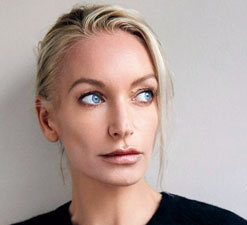
When an erotic thriller called Maestra hit the shelves in April 2016, it was billed as “the most shocking thriller you’ll read this year”. That promise — and a seductively red cover — helped sell tens of thousands of copies worldwide. A year later, we learn that the writer wasn’t even aiming to “shock”. She is, in fact, surprised that people are shocked.
Lisa Hilton, a 42-year-old art historian with a degree from Oxford University, and the author of several non-fiction titles, is writing an erotic trilogy under the name L.S. Hilton, of which the first novel was Maestra. It introduced us to Judith Rashleigh, a young woman working in an art gallery in London and moonlighting as a hostess in a champagne bar. She gets fired after stumbling into an art scam involving her boss, and takes off to the French Riviera with a wealthy client from the bar. That’s when the first — of many, many — death occurs. There’s copious amounts of sex and violence and crime spread across London, France and Italy, and finally Judith has what she always wanted — an art gallery of her own. Judith loves nobody, shows no remorse and will have sex with any man or woman that catches her fancy. But if there is one thing that she is genuine about it is her love and admiration for art.
The second part, Domina, came out this May and even as we were making our way back into Judith’s world of private jets, rare art and frequent orgies, an email popped up from Bloomsbury India saying that the author was in India! On Monday afternoon, t2 dialled Lisa Hilton while she was in New Delhi.

You have said you enjoyed Vikram Seth’s A Suitable Boy. Would you agree that your heroine, Judith Rashleigh, is a very unsuitable girl?
Yes (laughs), I would say that is a very apt description!
What went into making Judith?
I was really interested in breaking the rules of classic thriller fiction. I wanted to make a character who seemed fresh and modern and original… and write about a woman who got away with it, I suppose.
Maestra was marketed as the ‘most shocking thriller you’ll read this year’. Did you feel the pressure of this big statement?
I didn’t really know. I didn’t think I had written a shocking book, actually. I’m surprised. It seems to me a paradox that a woman who unapologetically enjoys sex, enjoys her body, should be seen as ‘shocking’ in the 21st century. Equally I think that nearly a hundred years after D.H. Lawrence wrote Lady Chatterley’s Lover, people will still be shocked by anyone using anatomically correct words… it seems quite strange.
What I did feel with Domina is that I wanted the character to evolve, I wanted the readers to read a fresh and different book than No. 1. I didn’t want to keep writing the same book. It’s important that you move your character along with your narrative and you keep giving your readers something new.

A: Wow! That’s very difficult. Ummm… I might go with Caravaggio’s Sick Bacchus (in picture), a painting I mention briefly in these books. It’s not necessarily a beautiful picture, it’s quite a disturbing picture, but it’s SO haunting and so poignant, and also so revolutionary technically. I think I’d probably need about 200 million pounds to buy that (laughs)!
One ends Maestra quite disliking Judith....
Yeah, in Maestra she’s not a sympathetic character at all (laughs lightly). But hopefully, by the end of No. 2, the reader will come to understand her a bit more, understand her background and her motivations a bit better, and perhaps feel more empathy with her.
Your background in art and history shines through in the writing, but what about violence and murder… how did you pull that off?
Well, because I come with a background in history, I think research is really very important, so I went at it like I would with any other project. I did a lot of reading, I read a lot of newspaper reports, for example. And for Domina, I read a lot about arms dealing and crime in Eastern Europe. I looked up what sort of methods they use….
I also did some quite practical research. Like I got a male friend to lie down and pulled him along the floor wrapped in a carpet so that I could experience physically what it was like to try and move a heavy man’s body so that I could put that information in the book. I also had a friend in the army bring me some guns to handle, so that I knew what it actually felt like to hold a real gun… which was quite scary.
I also did a lot of research with medical journals — a very good one is The Lancet — on what happens to the body, what are the physiological effects of, for example, being stabbed. So in the first book, Judith kills Cameron by stabbing him in the Achilles tendon, which has a paralysing effect on the whole body. I think particularly when you have a woman as a murderer, you have to think of quite ingenious ways to kill because she can’t necessarily rely on her physical strength, if she is trying to kill someone who is much bigger and more powerful than her.


How much did the success of Fifty Shades of Grey play a part in making these ‘erotic’ thrillers, rather than just thrillers?
Well, I don’t think Fifty Shades is a very sexy book. They don’t do it until page 119! And it’s about a virgin who falls in love with a powerful older man. Fifty Shades is a love story and I feel that Maestra should come with a warning on the cover that this is NOT a love story. But I think Fifty Shades did make people more open to the idea of seeing erotica in the mainstream, and it will be fair to say that I benefited from that, but I think the books are very, very different. Having said that, I think that anything which readers feel is empowering and honest about sexuality, is a good thing.
Do you think it is a great time to be a woman writer writing about unapologetic women protagonists — there’s Gone Girl, The Girl on the Train, then your books...
I do! I think it reflects a real cultural change. And it’s been very interesting being in India, and discussing fiction with the women here. I think back in the UK we have an idea that it’s a quite conservative society, but what I’ve learnt from being here in this short time is that that’s simply not true. More and more women are working, they are working parents, they are independent, and I think that yeah, to be writing for that sort of a market is really exciting.
Did you worry that the doyens of Oxford would raise their eyebrow at Judith?
(Laughs) No, I didn’t at all. I think in terms of sex and violence, Oxford University has seen it all. If you look at a lot of the things that I have studied as part of my degree, the 17th century poet, the Earl of Rochester, or indeed Geoffrey Chaucer were writing in a very unapologetic way about sex. And with history, there’s really nothing in terms of sex and violence that I could make up that is anything worse than, say, what Henry VIII got up to!
But you are writing these books under a different name...
My other books are published as Lisa Hilton and they are quite straightforward non-fiction history books. When we brought out Maestra we wanted to separate the two brands quite distinctly, so that’s why we used the initials. I’ve always been quite open about the fact that it’s the same person, this was just so as not to confuse buyers at the bookshops.
What kind of books were you reading when growing up?
I was and am a huge reader. All the English classics, obviously. But I also loved what we call in the UK ‘bonk busters’ — sex and shock novels. I really loved those when I was a teenager, I loved the way they were entertaining and provided a real sense of escape. So, books like Shirley Conran’s Lace, I really enjoyed. I would read and still read a lot of literature in French as well — (Honoré de) Balzac, (Émile) Zola, (Sidonie-Gabrielle) Collette… I did read a lot of classic American noir fiction too, people like (Raymond) Chandler….
What are you reading now?
A Russian novel, (Mikhail) Sholokhov’s And Quiet Flows the Don, and Contre Sainte Beuve, (Marcel) Proust’s commentary on 19th century artists.
Give us a sneak peek into the third book…
Well, it’ll be called Ultima and the locations will include Italy again, Tangier in Morocco, and Azerbaijan, but the story ends where it all began, in London.
We heard Maestra is going to be made into a TV series?
That’s right, yeah. It’s really exciting. The first one was bought by Sony Pictures, who are also acquiring book No. 2 and fingers crossed, we’ll see something on screen next year.
You’ve never described how Judith Rashleigh looks. How would you react if I said I pictured you as Judith while reading your books?
Oh, that makes me laugh! I don’t know whether to feel flattered or horrified (laughs)! The reason I don’t describe Judith is because I think fiction can be very prescriptive, you know, you have to look a certain way or be a certain body shape and I wanted the reader to imagine their own version of Judith.
Samhita Chakraborty











